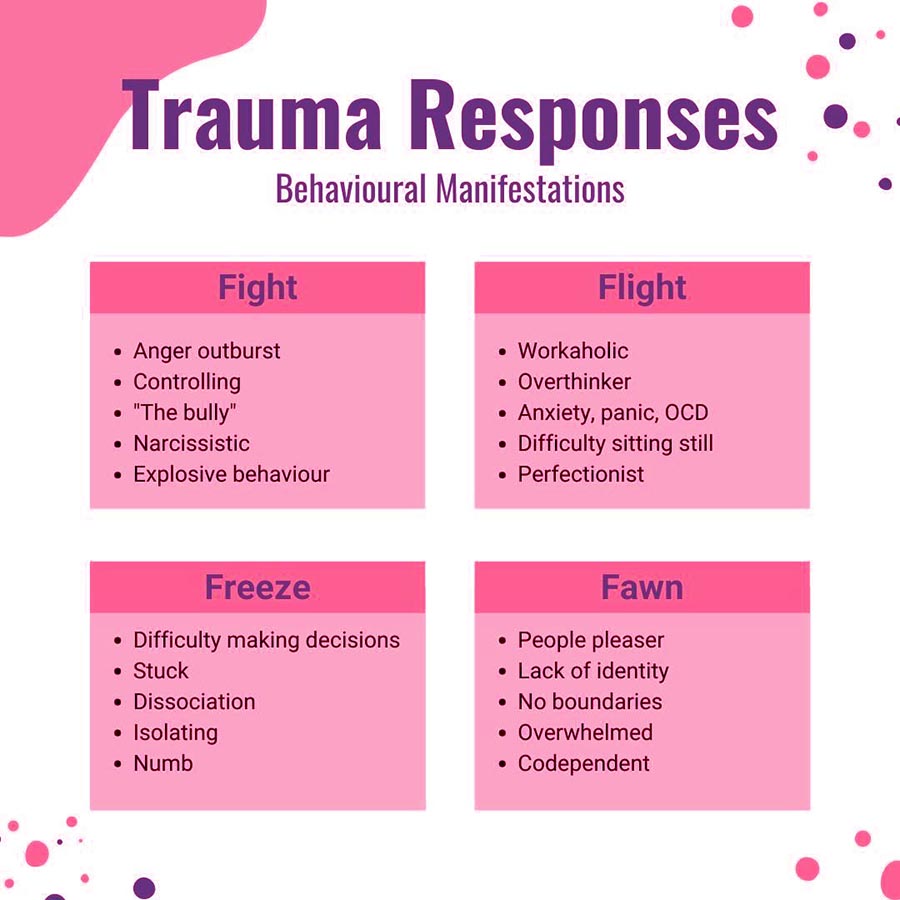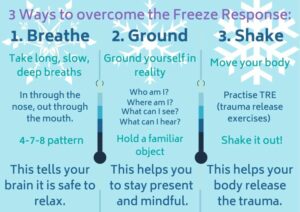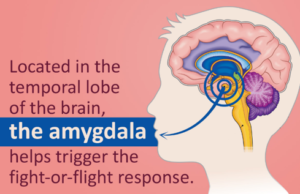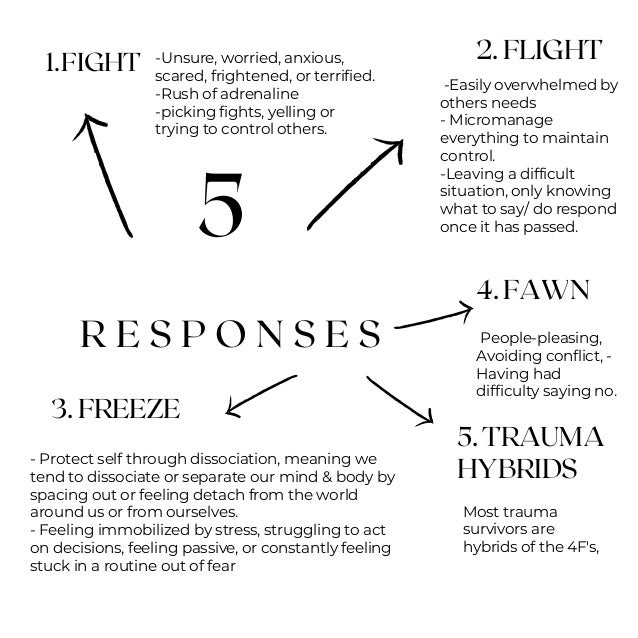When something unexpected or scary happens, many people experience a phenomenon known as “fight, flight, freeze, fawn.” This occurs when the brain goes into survival mode and causes the person to react in one of four ways. In this blog post, we will discuss the symptoms, tips, and therapies for the fight-flight-freeze fawn. We will also hear from experts about their experiences with this condition.
Contents
Understanding Fight, Flight, Freeze, Fawn
Fight, flight, freeze, and fawn are terms used to describe the four ways in which people can react when they are faced with a scary or unexpected situation.
- “Fight” is when a person reacts by becoming aggressive and trying to fight off the danger.
- “Flight” is when a person tries to escape from danger.
- “Freeze” is when a person becomes immobile and does not respond to the danger.
- “Fawn” is when a person behaves in an overly submissive or childlike manner.
Many people will experience all four of these reactions at different points, depending on the situation they are in. It is important to be aware of these reactions and to understand which one you are most likely to experience.
Recognizing Fight, Flight, Freeze, Fawn

It can be difficult to tell whether someone is experiencing a fight, flight, freeze, or fawn reaction. However, some clues can help you determine which response the person is having.
- People who are in “fight” mode may be angry or hostile. They may have a clenched jaw and tight muscles. Their eyes may be wide open, and they may be pacing back and forth.
- People who are in “flight” mode often look scared or panicked. They will often try to get away from the danger as quickly as possible. They may have a fast heart rate and be breathing quickly.
- People who are in “freeze” mode may look like they are in shock. They may have a blank expression on their face and be unable to move.
Fawning people often act very submissively or childishly. They may seem scared or lost, and they may not know what to do.
Coping With Fight, Flight, Freeze, Fawn

When you are experiencing a fight, flight, freeze, or fawn reaction, it can be difficult to think clearly or to take action. However, there are some things that you can do to help yourself.
During Fight Response
First and foremost, it is important to try to stay calm. If you can, take some deep breaths and focus on relaxing your muscles. This will help you to think more clearly and to make better decisions.
During Flight Response
If you are in a situation where you feel like you are in danger, it is important to trust your instincts. Also, do what feels right for you. So, if you are feeling scared or panicked, it is okay to try to get away from the situation.
-If you are feeling angry, it is okay to confront the person or situation that is causing you to feel this way.
During Freeze Response
If you find yourself in a freeze response, it is important to try to move your body and to get yourself into a safe position. This may mean getting into a fetal position, or it may mean moving to a place where you feel like you can better defend yourself.
During Fawn Response
If you are fawning, it is important to remember that you are in control of your own actions and decisions. You do not have to do what the other person wants you to do. You can stand up for yourself and say no.
Talking To Professional
If you are experiencing a fight, flight, freeze, or fawn reaction, it is likely that you are feeling scared, anxious, and overwhelmed. These reactions can be very intense and can last for a long time.
It is important to talk to a professional. Because professional help can provide you with support and guidance as you work through these feelings. Many therapies and medications can help you to cope with this condition.
Therapies
Some common therapies include:
- Cognitive Behavioral Therapy (CBT): CBT is a type of therapy that helps you to change the way you think about and react to situations.
- Dialectical Behavior Therapy (DBT): DBT is a type of therapy that helps you to learn how to cope with intense emotions.
- EMDR: EMDR is a type of therapy that helps you to process traumatic memories.
- Exposure and Response Prevention (ERP): ERP is a type of therapy that helps you to expose yourself to the things that trigger your symptoms and then teaches you how to prevent yourself from reacting.
NOTE: These therapies can help manage symptoms of the fight, flight, freeze, or fawn.
Medications
Medications that may be prescribed include:
Antidepressants: Antidepressants can help to improve mood and to reduce anxiety.
Anti-anxiety medications: Anti-anxiety medications can help to reduce anxiety and to improve sleep.
Benzodiazepines: Benzodiazepines can help to reduce anxiety and to improve sleep.
Beta-blockers: Beta-blockers can help to reduce the physical symptoms of anxiety, such as a fast heart rate and shaking hands.
NOTE: Medications can help manage symptoms of the fight, flight, freeze, or fawn. However, it is important to talk to a doctor before starting any medication.
Case Study
John is a 38-year-old man who has been experiencing anxiety for the past year. Even though he has been to see his doctor and has been prescribed medication. But he feels like his symptoms are getting worse. Moreover, he is having trouble sleeping and feels like he is always on edge.
He sometimes feels like he can’t breathe. And he often feels like he is going to die. John has been diagnosed with panic disorder and is currently in therapy. He is working on learning how to cope with his symptoms and is slowly starting to feel better.
Hearing From Experts
“The fight, flight, freeze, or fawn response is a natural reaction to danger. But when it’s constantly triggered by things that aren’t actually dangerous, it can be really tough to manage.
If you’re struggling with this, know that you’re not alone and there is help out there.”
– Kati Morton, therapist
Brain Activity During Fight, Flight, Freeze, Fawn

The table below shows the brain activity that is associated with each of the four reactions.
Fight: The fight response is associated with increased activity in the amygdala, which is responsible for fear and anxiety. This response is characterized by an increase in heart rate, breathing, and blood pressure.
Flight: The flight response is associated with increased activity in the hippocampus, which is responsible for memory and learning. This response is characterized by an increase in heart rate, breathing, and blood pressure.
Freeze: The freeze response is associated with decreased activity in the amygdala and increased activity in the prefrontal cortex, which is responsible for decision-making and problem-solving. This response is characterized by a decrease in heart rate, breathing, and blood pressure.
Fawn: The fawn response is associated with increased activity in the hippocampus and decreased activity in the prefrontal cortex. This response is characterized by a decrease in heart rate, breathing, and blood pressure.
Helping Someone One With Fight, Flight, Freeze Fawn
If you know someone who is experiencing these symptoms, it is important to be supportive.
- Listen to them and let them talk about their feelings.
- Do not judge them or tell them that they are being irrational.
- Be there for them and help them to find resources, such as therapy or medication.
NOTE: Let them know that they are not alone.
Conclusion
If you are experiencing symptoms of fight, flight, freeze, or fawn, it is important to seek professional help. There are many resources available that can help you to cope with these symptoms. With treatment, you can learn how to manage your symptoms and live a healthy and happy life.
A Word From Therapy Mantra
Your mental health — Your psychological, emotional, and social well-being — has an impact on every aspect of your life. Positive mental health essentially allows you to effectively deal with life’s everyday challenges.
At TherapyMantra, we have a team of therapists who provide affordable online therapy to assist you with issues such as depression, anxiety, stress, workplace Issues, addiction, relationship, OCD, LGBTQ, and PTSD. You can book a free therapy or download our free Android or iOS app.


